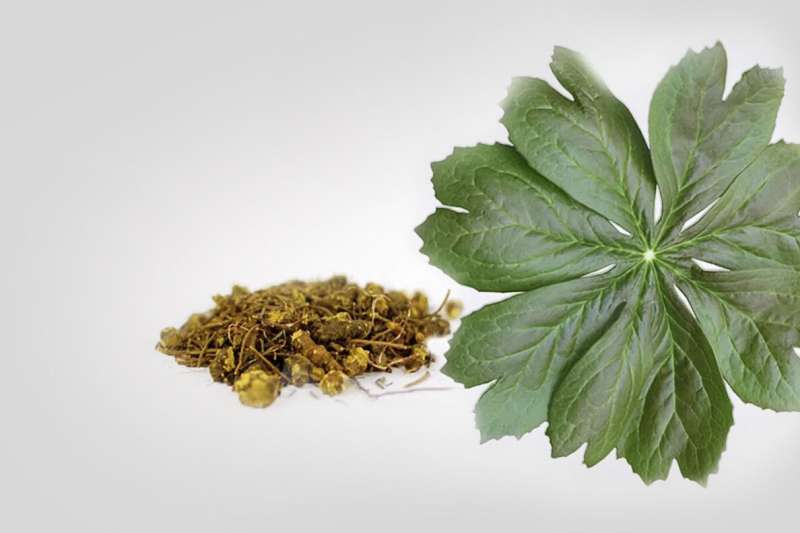Use of goldenseal may compromise glucose control in diabetics on metformin

Diabetic patients taking the natural product goldenseal while taking the prescription drug metformin may be unwittingly sabotaging their efforts to maintain healthy blood glucose levels. This concern arose from a recent study published in the journal Clinical Pharmacology & Therapeutics.
Metformin—the world's most-prescribed oral glucose-lowering medication—was included in a cocktail of selected drugs given to participants in a clinical study led by scientists at Washington State University's College of Pharmacy and Pharmaceutical Sciences. The study sought to determine the impact of goldenseal on specific drug transporters, proteins that facilitate absorption or expulsion of drug molecules in different tissues such as the intestine, liver and kidney.
"After six days of taking goldenseal, participants had about 25 percent less metformin in their bodies, a statistically significant change that could potentially impact glucose control in patients with type 2 diabetes," said the study's first author James Nguyen, a Ph.D. candidate in pharmaceutical sciences and recent Doctor of Pharmacy graduate. He said the finding serves as a caution to health care providers and patients that over-the-counter natural product use can lead to unwanted drug interactions, which may lead to negative health outcomes.
Unstable glucose levels increase patients' risk of serious health complications, such as heart disease, kidney disease and infections. Adding to that concern, Nguyen said there are reports that diabetic patients are increasingly using goldenseal and berberine—a substance found in goldenseal—to self-treat their condition, likely based on claims that berberine helps lower glucose levels.
A perennial herb native to North America, goldenseal is often combined with Echinacea, a top-selling botanical product, in herbal remedies used to self-treat the common cold and other respiratory tract infections. Goldenseal is also commonly used to self-treat digestive issues such as diarrhea and constipation as well as rashes and other skin problems.
Establishing Best Practices
Goldenseal is one of several natural products being studied by the researchers as part of the National Institutes of Health-funded Center of Excellence for Natural Product Drug Interaction Research, a WSU-led, multidisciplinary effort to develop standardized approaches for studying interactions between natural products and pharmaceutical drugs.
Senior author and center principal investigator Mary Paine—a professor in the WSU College of Pharmacy & Pharmaceutical Sciences—noted that while the Food and Drug Administration and other regulatory agencies have well-established guidelines for studying potential interactions between drugs, no such guidelines exist for natural product-drug interactions. This gap exists because, unlike drugs, natural products are not required to be tested for potential drug interaction risks prior to entering the market.
"Our work in this goldenseal study helps lay the foundation for establishing best practices for studying these interactions, with a particular niche in transporter-mediated interactions," Paine said.
Study Tests Model Predictions
One of the overarching goals of this recently published study was to determine whether established FDA basic mathematical models for predicting transporter-mediated drug-drug interactions could be used to successfully predict natural product-drug interactions. To find out, the researchers partnered with a contract research organization to conduct test tube experiments to determine whether a goldenseal extract inhibited any of 15 different transporters. Data from those experiments were then incorporated into the models to predict whether goldenseal interacts with any of the drugs included in a drug cocktail slated to be used in the subsequent clinical study. The cocktail included low doses of three different drugs known to be transported by various transporters: furosemide (a diuretic), rosuvastatin (an anti-cholesterol drug), and metformin. The drug midazolam (a short-acting sedative) was included in the cocktail as a positive control, or a drug known to interact with goldenseal. Goldenseal inhibits the metabolic enzyme that breaks down midazolam, leading to increased midazolam in the body.
Finally, they conducted a clinical study with 16 healthy participants to see if their predictions held up. Participants were given just the drug cocktail during the baseline phase. In the goldenseal exposure phase, participants took goldenseal three times daily for five days before being given the drug cocktail and another dose of goldenseal on day six, followed by two more doses later that day. Blood and urine samples were collected at regular intervals after participants took the drug cocktail and analyzed by the researchers to compare how each drug moved through the body with or without exposure to goldenseal.
Based on their model predictions, the researchers expected to find an interaction between goldenseal and rosuvastatin in the clinical study, but it did not materialize. Surprisingly, the clinical data showed that taking goldenseal along with metformin decreased metformin blood concentrations, which the model predictions did not reveal.
These findings will help the researchers refine these models to increase prediction accuracy of future natural product-drug interaction studies. As follow-up to the research, Nguyen plans to conduct studies to determine the mechanism by which goldenseal alters metformin absorption. Based on the data, he said that this appears to happen in the intestine and may be driven by the transporter OCT1. This research could eventually lead to the discovery of other natural product-drug interactions involving goldenseal and drugs transported by OCT1.
More information: James T. Nguyen et al, Assessing Transporter‐Mediated Natural Product‐Drug Interactions Via In vitro ‐ In Vivo Extrapolation: Clinical Evaluation With a Probe Cocktail, Clinical Pharmacology & Therapeutics (2020). DOI: 10.1002/cpt.2107




















